Written by 2022 Summer Intern Chloe Schwab, hosted by Dr. Mark Clark from UF/IFAS Soil, Water, and Ecosystem Sciences
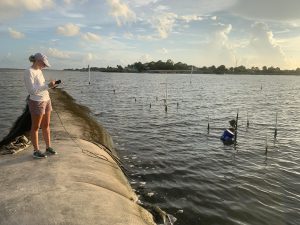 What is spat?
What is spat?
This summer I was able to be an NCBS summer intern for Dr. Clark and his project operation spatfall. We worked on various projects with an overarching goal of eastern oyster habitat restoration. In recent years oyster settlement numbers have been decreasing due to the lack of suitable substrate. Therefore, this project focuses on constructing biodegradable substrates in various shapes in order to increase oyster settlement and recruitment. Some of these structures have been successfully recruiting for around a year after being placed out in Cedar Key and thus, another one of our activities was checking the water quality around the oysters. We used plastic-sheeted covers which would contain the water around the oysters allowing us to accurately measure the rate of water filtration by the oysters. As seen in this picture, I was using a turbidimeter to measure the water quality around prisms (triangular-shaped substrate) every 15 minutes. This is essential as it measures the recruitment and viability of the oysters on our artificial substrate.
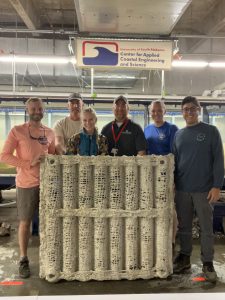 Field Trip
Field Trip
Moreover, another main event of this summer was traveling to the University of South Alabama to utilize their wave flume. A wave flume generates standardized wave conditions that can mimic real-life conditions. We used the wave flume to assess how our artificial settlement structures faired in varying intensities of wave conditions. It was amazing to clearly see how varied wavelengths and heights affected the stability of our substrate. Pictured here is the team standing in front of the wave flume. Additionally, one of my first roles in this internship was to use oyster shells and build a mock-up of a heavily recruited panel. By doing this, we should be able to see if there are any stability differences between empty and recruited substrates under different wave conditions.
In Conclusion
Overall, this internship has been an incredible experience that has greatly expanded my professional skills in marine sciences. One of the main skills that I am much more comfortable with now is the long hours and extreme weather conditions of fieldwork. This will be crucial in my future as I want to continue hands-on fieldwork as I move up in marine sciences. Additionally, working in Cedar Key exposed me to another marine habitat of salt marshes and intense low and high tides which were very different than the habitats I grew up with. I am forever grateful for this opportunity, and I will carry the skills I learned as I continue my marine science career.

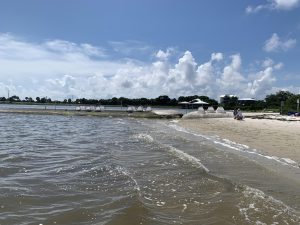
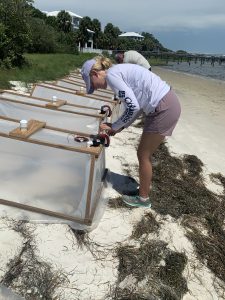
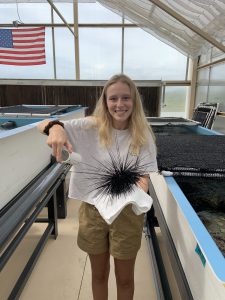
 0
0
